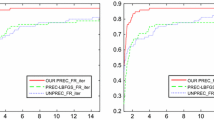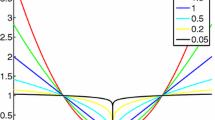Abstract
We present a framework for high-performance quasi-linear Bayesian inverse modelling and its application in hydrogeology; extensions to other domains of application are straightforward due to generic programming and modular design choices. The central component of the framework is a collection of specialized preconditioned methods for nonlinear least squares: the classical three-term recurrence relation of Conjugate Gradients and related methods is replaced by a specific choice of six-term recurrence relation, which is used to reformulate the resulting optimization problem and eliminate several costly matrix-vector products. We demonstrate that this reformulation leads to improved performance, robustness, and accuracy for a synthetic example application from hydrogeology. The proposed prior-preconditioned caching CG scheme is the only one among the considered CG methods that scales perfectly in the number of estimated parameters. In the highly relevant case of sparse measurements, the proposed method is up to two orders of magnitude faster than the classical CG scheme, and at least six times faster than a prior-preconditioned, non-caching version. It is therefore particularly suited for the large-scale inversion of sparse observations.
Access this chapter
Tax calculation will be finalised at checkout
Purchases are for personal use only
Similar content being viewed by others
References
Alcolea, A., Carrera, J., Medina, A.: Pilot points method incorporating prior information for solving the groundwater flow inverse problem. Adv. Water Resour. 29(11), 1678–1689 (2006)
Bastian, P., Blatt, M., Dedner, A., Engwer C., Klöfkorn, R., Kornhuber, R., Ohlbergerm M., Sander, O.: A generic grid interface for parallel and adaptive scientific computing. part ii: Implementation and tests in dune. Computing 82(2–3), 121–138 (2008)
Bastian, P., Blatt, M., Dedner, A., Engwer C., Klöfkorn, R., Ohlbergerm M., Sander, O.: A generic grid interface for parallel and adaptive scientific computing. part i: abstract framework. Computing 82(2–3), 103–119 (2008)
Bastian, P., Blatt, M., Engwer C., Dedner, A., Klöfkorn, R., Kuttanikkad, S., Ohlberger, M., Sander, O.: The distributed and unified numerics environment (dune). In: Proceedings of the 19th Symposium on Simulation Technique in Hannover (2006)
Bui-Thanh, T., Burstedde, C., Ghattas, O., Martin, J., Stadler, G., Wilcox, L.C.: Extreme-scale uq for bayesian inverse problems governed by pdes. In: Proceedings of the International Conference on High Performance Computing, Networking, Storage and Analysis, p. 3. IEEE Computer Society Press (2012)
Chávez, G., Turkiyyah, G., Zampini, S., Keyes, D.: Parallel accelerated cyclic reduction preconditioner for three-dimensional elliptic pdes with variable coefficients. J. Comput. Appl. Math. 344, 760–781 (2018)
Cockett, R., Heagy, L.J., Haber, E.: Efficient 3d inversions using the richards equation. Comput. Geosci. (2018)
Cotter, S.L., Roberts, G.O., Stuart, A.M., White, D., et al.: Mcmc methods for functions: modifying old algorithms to make them faster. Stat. Sci. 28(3), 424–446 (2013)
Dietrich, C.R., Newsam, G.N.: Fast and exact simulation of stationary gaussian processes through circulant embedding of the covariance matrix. SIAM J. Sci. Comput. 18(4), 1088–1107 (1997)
Frigo, M., Johnson, S.G.: The design and implementation of fftw3. Proc. IEEE 93(2), 216–231 (2005)
Fritz, J., Neuweiler, I., Nowak, W.: Application of fft-based algorithms for large-scale universal kriging problems. Math. Geosci. 41(5), 509–533 (2009)
Hadamard, J.: Sur les problèmes aux dérivées partielles et leur signification physique. Princeton Univ. Bull. 13(49–52), 28 (1902)
Hager, W.W., Zhang, H.: A survey of nonlinear conjugate gradient methods. Pacific J. Optim. 2(1), 35–58 (2006)
Kitanidis, P.K.: Quasi-linear geostatistical theory for inversing. Water Resour. Res. 31(10), 2411–2419 (1995)
Klein, O.: dune-randomfield. https://gitlab.dune-project.org/oklein/dune-randomfield (2016)
Klein, O.: Preconditioned and randomized methods for efficient bayesian inversion of large data sets and their application to flow and transport in porous media. PhD thesis, Interdisciplinary Center for Scientific Computing (IWR), Heidelberg University, Heidelberg (2016)
Klein, O., Cirpka, O.A., Bastian, P., Ippisch, O.: Efficient geostatistical inversion of transient groundwater flow using preconditioned nonlinear conjugate gradients. Adv. Water Resour. 102, 161–177 (2017)
Lee, J., Kitanidis, P.K.: Large-scale hydraulic tomography and joint inversion of head and tracer data using the principal component geostatistical approach (pcga). Water Resour. Res. 50(7), 5410–5427 (2014)
Li, W., Cirpka, O.A.: Efficient geostatistical inverse methods for structured and unstructured grids. Water Resour. Res. 42(6) (2006)
Li, W., Nowak, W., Cirpka, O.A.: Geostatistical inverse modeling of transient pumping tests using temporal moments of drawdown. Water Resour. Res. 41(8) (2005)
Mohring, J., Milk, R., Ngo, A., Klein, O., Iliev, O., Ohlberger, M., Bastian, P.: Uncertainty quantification for porous media flow using multilevel monte carlo. In: International Conference on Large-Scale Scientific Computing, pp. 145–152. Springer (2015)
Nocedal, J.: Updating quasi-newton matrices with limited storage. Math. Comput. 35(151), 773–782 (1980)
Nowak, W., Cirpka, O.A.: A modified levenberg-marquardt algorithm for quasi-linear geostatistical inversing. Adv. Water Resour. 27(7), 737–750 (2004)
Nowak, W., Litvinenko, A.: Kriging and spatial design accelerated by orders of magnitude: combining low-rank covariance approximations with fft-techniques. Math. Geosci. 45(4), 411–435 (2013)
Plessix, R.-E.: A review of the adjoint-state method for computing the gradient of a functional with geophysical applications. Geophys. J. Int. 167(2), 495–503 (2006)
Schwede, R.L., Ngo, A., Bastian, P., Ippisch, O., Li, W., Cirpka, O.A.: Efficient parallelization of geostatistical inversion using the quasi-linear approach. Comput. Geosci. 44, 78–85 (2012)
Acknowledgements
The first steps towards what would turn into the discussed generic framework were undertaken as part of the Project TOMOME supported by the Federal Ministry of Education and Research of Germany (BMBF), Grant No. 03G0742B. The main development effort for the current implementation took place as part of the research alliance “Data-Integrated Simulation Science” between the universities of Stuttgart and Heidelberg, funded by the MWK Baden-Württemberg, AZ:@ 7533.-30-20/5/1. The financial support of the funding agencies is gratefully acknowledged. The author would also like to thank Wolfgang Nowak and an anonymous reviewer, whose insightful comments helped improve the final version of this manuscript.
Author information
Authors and Affiliations
Corresponding author
Editor information
Editors and Affiliations
Rights and permissions
Copyright information
© 2021 Springer Nature Switzerland AG
About this paper
Cite this paper
Klein, O. (2021). An Improved Conjugate Gradients Method for Quasi-linear Bayesian Inverse Problems, Tested on an Example from Hydrogeology. In: Bock, H.G., Jäger, W., Kostina, E., Phu, H.X. (eds) Modeling, Simulation and Optimization of Complex Processes HPSC 2018. Springer, Cham. https://doi.org/10.1007/978-3-030-55240-4_17
Download citation
DOI: https://doi.org/10.1007/978-3-030-55240-4_17
Published:
Publisher Name: Springer, Cham
Print ISBN: 978-3-030-55239-8
Online ISBN: 978-3-030-55240-4
eBook Packages: Mathematics and StatisticsMathematics and Statistics (R0)




